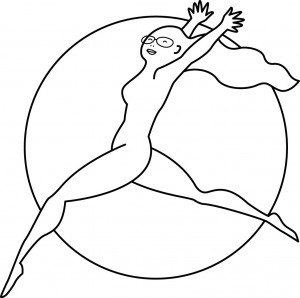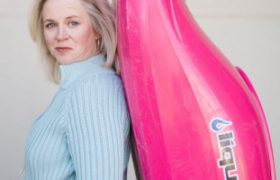Helen Todd combines her career in Public Relations with a passion for whitewater kayaking. She’s served in leadership positions in both worlds–she’s a member of PRSA, PRCA, and holds an APR, as well as serving as past president of the Birmingham Canoe Club. Helen is devoted to bringing others to her sport and is a level IV whitewater kayak instructor, a level III instructor/trainer, and also has an adaptive endorsement from the ACA. For 20 years, Helen worked for corporations such as Southern Living magazine, the University of Alabama in Birmingham, Health South Corporation, and Regions Bank. She began her own PR company in 2012, Fluid Communications. Check out her website and follow her on Facebook and Instagram.
SCT: Tell us a bit about yourself.
HT: I was born and raised in Birmingham, Alabama. Mom and Dad are from here. With two older siblings, I’m the baby in the family. I wasn’t supposed to live as a newborn, I was an Rh baby with a blood transfusion at birth. Mom didn’t think I was going to make it. So dad went to hospital and picked me up and brought me home. They had no baby room, no nothing.
I didn’t get married until later in life. I’ve always been passionate about my work and career, starting in radio and television, and moving into public relations. I’ve seen some amazing things, good and bad. I’ve had fabulous work experiences such as helping to locate Mercedes Benz to Alabama on the one hand, to the crisis communications end of the spectrum working through the Richard Schrushy debacle at Health South Corporation.
I had an exciting media career, and then I became obsessed with whitewater paddling. It gives me an outlet to manage all the stressful times. Kayaking for me is a place to go to not think about everything else. And it’s provided me with a community of people that don’t care what I do for a living and don’t care where I’m from. They just enjoy me for the time we spend together on the river and the camaraderie that we create.
SCT: How are you trying to marry your two passions?
HT: Crisis communications is a lot like whitewater kayaking. You prepare for the worst on the river: We bring safety gear, ropes, and tools; I get plenty of training before I come; I scout rapids, I do everything I can to keep myself and those around me safe. Crisis communications is much the same. We plan for the worst, though we never know what the worst is. We form our relationships in the company. We know the communications channels, and we plan in advance for crisis. But we never really know what may happen, because there are always things on the river and in business that you can’t control. So you have to be fluid. That’s where I coined my company’s name, Fluid Communications.
SCT: Do you see yourself doing PR work in the whitewater field?
HT: I looked at that, but most whitewater companies are seasonal, plus they operate on shoestring budgets. Making a living helping them is not very realistic. However, I do what I can. Last fall I went out and gave a presentation at the National Paddlesport Conference on how those small companies can help themselves with social media. Some are savvy at it, but most are open to learning more. That’s where I love to help.
SCT: Let’s get real. Aren’t you a little scared of hurting yourself on the water? Aren’t you a bit sore now? [Helen has just shown up to our interview with a stiff neck from a rough run on the Little River Canyon in North Alabama.]
HT: I took a bad swim on Sunday. I’ve taken some good licks, but this is the first time I think I almost cried. I finished the day. The injury is like a whiplash. My friends gave me hydrocodone and I was laughing and in pain as I finished running the river later that afternoon.
SCT: But again, aren’t your worried about injury?
HT: Sure. But that’s also where the excitement comes in. You don’t want to hurt yourself. Nobody wants that. It’s part of the risk. There’s a risk whether you’re doing class II whitewater or class IV. Likewise, there’s a risk when you drive down the interstate. Yes, I take risks but I try to be as safe as I possibly can.
SCT: How do you stay in shape to paddle on weekends?
HT: I run and do Crossfit. I’m up between 5 and 6 every morning to get moving. I learned early on that exercising at the end of the day was not going to happen. Getting up early and having a no-excuses attitude is what makes it happen.
SCT: You recently took an international trip to Ecuador by yourself with women you did not know. Have you done this before and would you do it again?
HT: I’d never done anything like it before. And, yes, I would do it again, 110%. It was a frightening experience traveling alone after being married for so long [Helen is currently going through a divorce after a 17 year marriage]. Part of travel and the journey is facing your fear.
SCT: What were you afraid of?
HT: Not connecting with my travel partners when I landed. A car not being there to pick me up. Losing my passport.
SCT: Did any of those things happen?
HT: No.
SCT: So what do you make of that?
HT: It’s a correlation to paddling on a river. Sometimes you simply must trust the line. Last weekend I was paddling and there was a line up onto a wave moving toward a rock. Everything in my being was saying ‘No, no, no!’ and I have to say ‘Trust it, trust it, trust it!’ It works out. I have to trust that I’m a grown woman. There’s probably no situation that I couldn’t get myself out if need be. However, I did buy travel insurance and med jet before I left town.
SCT: What would you suggest to women who want to try a new sport/activity?
HT: Take a chance. Do something you’ve always wanted to do. Whether you do it with someone you know or not, take a beginner course. Do a buddy skydive. Take an intro kayak course with or without a friend. Take that risk, take that chance. If you discover that the activity is not for you, great, don’t do it again. But continue to take chances.
SCT: Any suggestions for how newbies can face the fear of failure and pain?
HT: Life is full of failure and pain. My motto on the river is that if you’re not swimming, you’re not learning. Failure is a part of anything. Once you succeed, you move past failure and you’re accomplished. Facing those fears is what makes people feel empowered. I can come back from a weekend on the river knowing what I’ve accomplished. I tell myself, ‘Okay, I did that. I can handle anything this week is going to throw at me.’


Leave a Reply